Ethiopia
‘Africa Rising’ has become a term synonymous with the rapid growth being witnessed across Africa, a continent often referred to in the not too distant past as the ‘Dark Continent’.
Whereas parts of the continent are indeed ‘rising’, there is no denying the fact that recent events like the unrest in South Sudan and the Democratic Republic of Congo as well as the bombardments by al-Shabab in Somalia cast doubts over the amount of progress being made.
Chairperson of the African Union Commission, Moussa Faki Mahamat however believes Africa will continue to experience growth in spite of the challenges it faces.
“With an average growth rate of 5% over the last 15 years, with six countries among the top 10 in the world’s most dynamic economies, it is clear that Africa is one of the regions of the world where growth is definitely fastest but where challenges remain in reaping the full benefits of its human and natural resources,” Mahamat said in a statement to commemorate Africa Day on Thursday.
He thus wants Africans to do away with the notion that the continent is disadvantaged.
Africa’s population surpassed 1.2 billion this month, a figure which represents just under 17% of the world population.
“This makes Africa the second most populous continent in the world after Asia and also the continent with the youngest economically active population,” Mahamat argued stressing that it is “important to transform this huge human energy into a dynamic and creative development tool.”
But churning the energies into a creative or dynamic development tool is not all there is to it.
Africa he said must “no longer accept the marginalization of our continent.
“We all – political leaders, civil society, the private sector, ordinary citizens, the diaspora … have the moral obligation to fight against this marginalization of Africa.”
But Moussa Faki Mahamat was not the only one calling for continental cooperation on the day.
Former Ghanaian President, John Dramani Mahama also called on Africans to come together as a common force to ‘fight’ to shape Africa’s future like “our forebears envisaged”.
John Dramani Mahama in a Facebook post to commemorate the day, noted that the journey towards freedom in Africa has been very daunting but however, the spirit of Pan-Africanism has been unquenchable.
“Let’s keep working at it, let’s tear down the barriers, let’s tear down stereotypes, let’s tear down the relics of Neocolonialism and let’s work hard to shape our common future as our forebears envisaged,” Mahama wrote.
On May 25, 1963, the Organization of African Unity was founded in the Ethiopian capital Addis Ababa with the aims of intensifying cooperation of African states to better the lives of citizens, defending the sovereignty and independence of African states as well as eradicating all forms of colonialism and minority rule which was rife at the time of its formation.
Apart from the successes chalked during the liberation struggles in the 60s when it was formed, economic integration and free movement of people have largely remained ideals shared by the union but are yet to be realized.
Moussa Faki Mahamat who took over as AU Commission chair from Nkosazana Dlamini-Zuma in February this year is confident implementation of the Africa Agenda 2063 – a socio-economic transformational program for the continent over the next 50 years – is vital to realizing the goals of continental unity.
The Agenda 2063, to be rolled out in phases has as priority projects, the liberalization of the African airspace, creation of a continental free trade area, an African passport, free movement of goods and persons as well as ending conflicts by 2020.
Mahamat said as Africa worked towards achieving its Agenda 2063, there was the need to do so through “synergy and complementarity” with the UN’s Sustainable Development Goals, a point echoed by the UN Secretary General, Antonio Guterres in his message on Africa Day.
“The international community has entered the second year of implementing the 2030 Agenda for Sustainable Development, an all-out effort to tackle global poverty, inequality, instability and injustice. Africa has adopted its own complementary and ambitious plan: Agenda 2063.
“For the people of Africa to fully benefit from these important efforts, these two agendas need to be strategically aligned,” Guterres said in his message.
Guterres who applauded Africa for providing the majority of the UN’s peacekeepers around the world and for being among the “world’s largest and most generous hosts of refugees” said: “All of humanity will benefit by listening, learning and working with the people of Africa.”
The world could indeed benefit a lot by cooperating with Africa, but that means Africa will have to get its own house in order by dealing with the “atrocious tragedies that plague South Sudan, Somalia, Central African Republic, the Lake Chad Basin and the Sahel” as Mahamat indicated in his message.
“Of all these humanitarian crises, the tragedy of South Sudan is the most unbearable,” he said adding that crimes committed by the parties involved cannot continue.
“I urge the parties to stop these massive crimes and, without delay, to establish an inclusive dialogue, to re-determine a peaceful destiny for their people. For this, the leaders can count on our readiness to assist with all our strength and resolve. But first, the violence and the suffering must stop.”
At least three out of five Africans are said to be under 35 years making Africa the continent with the most active and youthful population but unemployment on the continent is high.
The AU Commission Chair thus wants governments to investment in the youth by creating jobs, investing in education, improved social services and universal healthcare coverage.
The investment in the youth, Mahamat said should encompass the promotion of culture, positive values and sports.




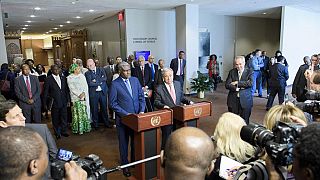
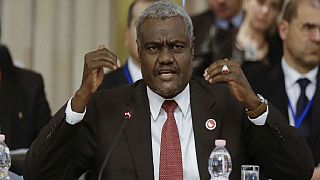
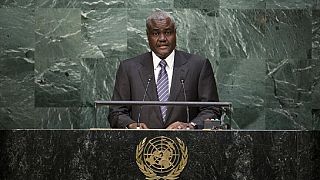

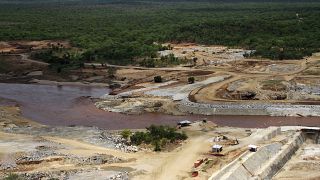
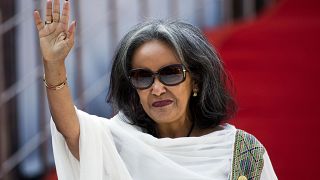



11:05
Africa's hight cost of climate change [Business Africa]
02:09
Russia vetoes UN resolution calling for immediate cease-fire in Sudan
01:17
COP29 finance talks lag as the summit reaches its halfway mark
01:38
COP29: What next for Africa's energy transition?
01:00
Civil society takes center stage at Brazil’s G20 social summit
01:07
Sudan keeps key aid crossing from Chad open to keep humanitarian aid flowing